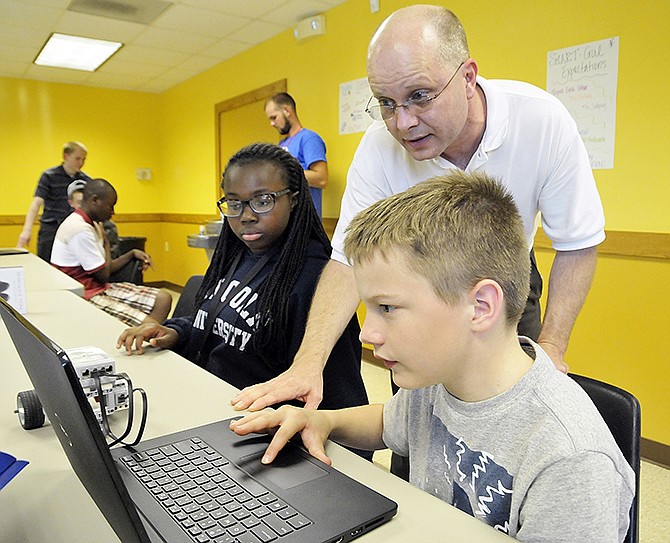A $1.8 million grant is allowing the Boys and Girls Club of the Capital City to expose children to science, technology, math and music programs they may not be able to get in a normal school setting.
"In 2013, the Boys and Girls Club opened our teen center on Edmonds Street because we outgrew our facility on Elm Street," Executive Director Stephanie Johnson said. "We were serving kids ranging in age from kindergarten all the way through high school.
"We applied for a 21st Century Community Learning Center Grant through the Department of Elementary and Secondary Education last summer and were fortunate to get the grant.
"The program is being done at both middle schools in the public schools as well as the teen center."
Johnson said the grant money was spread over five years so they have four more years left.
Brian Valentine is project administrator and implements the programs at the various sites. He said they offer tutoring and programs that are topic-specific in areas such as the sciences and the arts.
"The kids get to work with instruments, do actual canvas art and take cooking classes," he said. "We work to recruit the best staff to make sure the kids are getting the best experience possible."
Valentine said their demographics go from kids with parents who are very affluent to those who just don't have much at all.
"Our job is to partner with the schools, and we try to come up with an experience to where the kids can work hands-on," he explained, "see what it really means versus just regurgitating material and learning for a test."
Ben Herrick is director of the teen center and says every day they have programs ranging from experiments, where kids build model volcanoes, to talking about the importance of doing homework.
"We also have life skill programs such as Passport to Manhood and Smart Girls-Smart Moves, which accentuate skills (they) may not be learning at home, or (which) just need someone to give them an extra boost in these areas," he said. "Passport to Manhood teaches the values of courage and honesty and how do we apply those skills.
"We tell students to do things even when you don't want to because you're going to be learning what talents and skills you have that you may not have been aware of in the past. We want to expand their horizons."
In January, the students were exposed to different cultures around the world so they could see what it's like to live outside of the United States, primarily through guest speakers' presentations.
Now that the program has been in place for a year, Valentine and Herrick said they can see positive changes in the kids who have been involved.
"One of the things I've learned is people don't understand what all we can teach these kids through these programs," Valentine said. "If you have an interest in styling hair, that's science. If you want to go into auto mechanics that's science as well.
"I've also seen the kids being challenged and stretched in different areas and that's great to see."
Herrick said: "I noticed changes when the kids came back from winter break in January.
"I used to have kids come up and ask, "When can I play video games?' And then they started asking when could they do their homework. It was subtle changes where they don't understand that their language and mindsets are changing.
"We're seeing the harvest in how they are approaching their academics and life skills. I tell them that if they make a mistake to confess it, and we'll help you make the changes for a better future and how to make something good out of the bad."
Johnson added: "There is a common misconception in our community that the Boys and Girls Club is an after-school babysitting service - and that couldn't be any further from the truth."
From June 2015 through last month, Johnson said 765 kids, ranging from ages five through 18, were served by the Boys and Girls Club.
"We believe if they are to grow up to be a productive adult these kids need to have academic success, develop good character and citizenship, and they need to lead a healthy lifestyle."
Johnson said the program "is a great opportunity for kids to explore science and technology. A lot of kids considered under-served don't get exposure to things like robotics, culinary arts, so it shows them hands on learning.
Services at the club are provided at no cost to children of any age, regardless of economic background. Elementary-aged children can join the club for free if they are on the free/reduced lunch program at school, so 95 percent of the children at the local club have no cost to their families. If not receiving free/reduced lunches, contact the club, 634-2582, for membership rates. Scholarships are available.

